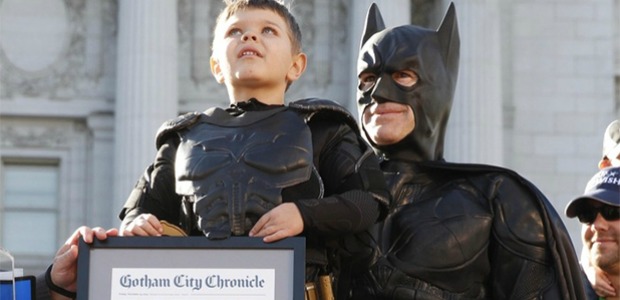There’s a good chance that you’re already fully aware of the tale of Miles Scott, aka Batkid. If you're not, then prepare for a smile to soon be etched across your face, because it’s one of the most uplifting stories you’re ever likely to hear.
Diagnosed with lymphoblastic leukemia at just 18 months old, Miles Scott underwent chemotherapy for several years. As he neared the end of his treatment, Scott was visited by the San Francisco Make-A-Wish foundation. They asked him what he wanted more than anything else in the whole world. He responded: “I wish to be Batkid.”
Now there was probably a simple way to do that. However, because of the towering efforts of the likes of Make-A-Wish’s Patricia Wilson, inventor Eric Johnson, software engineer Mike Jutan, and literally a cavalcade of compassionate individuals and volunteers, Miles Scott’s day as Batkid turned into a worldwide phenomenon that saw tens of thousands of people in San Francisco participate -- and hundreds of millions of people follow it from home.
A movie version of the above tale (which is so immediately uplifting I feel as though I could use it to power to the moon) could have easily been schmaltzy, emotionally exploitative, and a mundane reminder of Miles Scott’s adventure. Sure, it made for a great article and a great puff piece on the news, but was it capable of being cinematic?
Director and co-writer Dana Nachman, who scribed the film alongside Kurt Kuenne, manages to impressively elongate Batkid's story, though, by embracing just how absurd the phenomenon became. At the same time, she litters Batkid Begins with intimate details of the day, including the mistakes and errors, which makes the whole experience powerfully human. But, most important, Batkid Begins takes advantage of the constant filming from press, social media, and behind-the-scenes footage from throughout the day to give us unfiltered access to the amazing adventure.
Batkid Begins knows just how affecting its story is, though, and it simply presents us with the events and circumstances as they unfolded. It cleverly opens up with an animated sequence that provide us with the details of Miles Scott’s battle with cancer up until the days leading up to Batkid’s unveiling. It’s fun, fresh, and it keeps the weighty content light, while at the same time reminding us of just how brave and strong Miles has been.
When Miles’ Make-A-Wish fantasy is revealed he suddenly moves to the background, and we’re introduced to the vast array of people whose job it is to turn his dream into a reality. Miles’ presence is still felt, though, as the world can't help but become intrigued and enamored with his unrivaled bravery.
Learning about the efforts of people who stepped up to assist Miles is truly emotional, and to even begin to list the people who went above and beyond to turn San Francisco into Gotham or Miles into a miniature crime-fighter would be doing those I don't mention an injustice. Meanwhile, it’s also interesting to learn of the perils of the increasing expansion of Batkid, which almost led to it being called off because of security concerns and the fact that it could all be too much for shy Miles. But when the day finally comes, Miles’ much-amped participation– just like Orson Welles in The Third Man when he’s been repeatedly mentioned but not seen – is truly triumphant and perpetually feel-good.
Yes, at the end Batkid Begins is overwrought and over-analytical, but you’d have to be a full-time cynic not to be engrossed, impressed and overwhelmed with the combined efforts of the thousands of volunteers that gathered to create Miles Scott’s adventure. It also feels more profound because Miles is ignorant to his courage and impact. But because of the power of his plight, Batkid Begins is not only a worthy addition to Batman’s oeuvre, but it is also a firm reminder of the power of pop culture, and how it can band the world together. Which is why it will take something mightily impressive to stop it being the most heartwarming film of the year.












